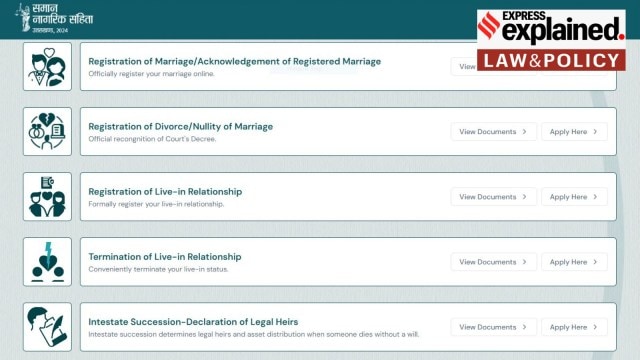The Uttarakhand UCC makes it compulsory to register all live-in relationships. This applies to Uttarakhand residents living in the state as well as those living elsewhere in India. Chief Minister Pushkar Singh Dhami has said that a law regulating live-in relationships is necessary to avoid domestic crimes outside of marriage.

Here’s how the new regulation works.
First, what is a live-in relationship?
The Uttarakhand UCC describes a live-in relationship as a relationship between a man and a woman, “who cohabit in a shared household through a relationship in the nature of marriage.”
The term “shared household” is defined as one “where a man and a woman, not being minors, live under one roof in a rented accommodation or in a house owned jointly or by any one of them or any other accommodation.”
Essentially, cohabitation by a male and a female adult and managing of a household, subject to exceptions, qualifies as a live-in relationship.
Who can enter into a live-in relationship?
The aforementioned definition, however, covers only heterosexual relationships. It also specifies certain groups that are prohibited from entering such a relationship, like in the case of marriage. The Uttarakhand UCC mentions some 74 prohibited relationships for marriage, including first cousins.
Additionally, the law states that one cannot enter a live-in relationship with a person who is already married or in another live-in relationship.
Story continues below this ad
There is also a crucial provision which states that “where the consent of one of the partners was obtained by force, coercion, undue influence, misrepresentation or fraud as to any material fact or circumstance concerning the other partner, including her/his identity,” the relationship will not be counted as a live-in relationship.
The Registrar has the power to make a “summary inquiry” at the time of registration to ascertain if a relationship being registered is indeed in the nature prescribed by law. Questions of consent, identity can all be “verified” by the government.
How does the UCC regulate live-in relationships?
Part 3 of Uttarakhand’s UCC deals with live-in relationships. The law essentially requires individuals to submit “a statement of live-in relationship” within a month of entering such a relationship. It also requires them to submit a statement of “termination of relationship.”
The law states that the registration is only for the “purposes of record keeping” and also that the Registrar will forward these statements to the local police stations where the couple lives, and in case one of them is less than 21 years of age, to their parent or local guardian.
Story continues below this ad
How does one register a live-in relationship?
For live-in couples, the code stipulates either online or offline registration. For online registration, citizens need to register with their Aadhaar. An OTP will be sent to the mobile number linked to Aadhaar.
For offline registration, the couple may approach the registrar of their jurisdiction (in the place of the shared household) with the requisite registration form and supporting documents. The application will be verified by the registrar within 30 days of its receipt. If it is rejected, an appeal can be sent within 30 days.
The Rules also state that if one of the live-in partners dies during the continuance of a live-in relationship, the partner shall update this information within thirty days from the date of issuance of the death certificate of the deceased.
The Rules, in Form 3 of the annexures prescribe a 16 page form for registration of a live-in relationship.
What are the documents required?
The UCC Rules require the following documents.
- 01
Proof of age of the couple
If any or both partners are below the age of 21 years, their parents will be informed by the Registrar.
- 02
Proof(s) of residency
For those from Uttarakhand, this could be a domicile certificate or an employment certificate (in the case of government employees). For those living in Uttarakhand for one year or more, this would be an at least one year old electricity/water bill or relevant extracts of Passport or rent agreement, along with an at least one year old tenant verification certificate. The Registrar shall speak to the landlord of a live-in couple before issuing the registration certificate. However, the rules also state that a landlord should ask for the registration certificate or provisional certificate before entering into a rent agreement with a live-in couple.
- 03
Proof of previous history of relationship
This would include a final decree of divorce, final decree of nullity of marriage, death certificate of spouse, and certificate of terminated live-in relationship.
- 04
Proof of permissibility of marriage.
This is a new legal documentation required to ascertain that the couple are not within the degrees of prohibited relationship. The Rules require a certificate issued by a “religious leader/community head concerned or official of a religious/community body concerned that the customs & usage governing the party/parties to the marriage permit the marriage within the degrees of prohibited relationship.” Essentially, this certificate would have to show that if they wished, the couple could be married. The Rules also require full name, address and email id of the religious official certifying the relationship.
What are the benefits of registering?
Story continues below this ad
If a woman is deserted by her live-in partner, she can seek maintenance as if they had been married. The law states that the provisions related to maintenance in a marriage shall apply mutatis-mutandis (a Latin legal term to indicate correlation).
The law also states that legitimacy of a child born out of a live-in relationship shall be recognised. It has been the position of law since 1976, and has been widely applied by the Supreme Court, that children born out of wedlock are legitimate and can inherit property.
Section 16(1) of the Hindu Marriage states that “notwithstanding that a marriage is null and void,” under the Act, “any child of such marriage who would have been legitimate if the marriage had been valid, shall be legitimate.” How a marriage is defined, whether the man is already married are all questions of facts that courts have to decide on a case to case basis.
The Rules also state that as long as a certificate or a provisional certificate of a live-in relationship is available, no landlord can refuse tenancy solely because a couple is not married.
What happens if a couple fails to register?
Story continues below this ad
There is a jail term prescribed for not registering a live-in relationship. Also, the rules prescribe that landlords are required to ask for a certificate for renting a house to an unmarried couple.
Under the UCC Act, a person who fails to register a live-in relationship within 30 days of entering into one, could face charges. Upon conviction, a magistrate can sentence the individual with a jail term of up to three months, or with a fine up to Rs 10,000 or both.
The Registrar, either on his own account or based on a complaint that a person has not registered their live-in relationship can issue a notice for registration. If the person fails to comply with the notice, he could face charges. Upon conviction, a magistrate can sentence the individual with a jail term of up to six months, or with a fine up to Rs 25,000 or both.
If a person has filed a false complaint about another person, the complainant shall be cautioned and warned to be careful in future. If the same person files another complaint which is found false, they will be asked to pay a fine as determined by the State Government, and on further false complaints by the same person, they will be liable to pay a heavier fine.








































